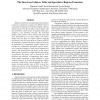Free Online Productivity Tools
i2Speak
i2Symbol
i2OCR
iTex2Img
iWeb2Print
iWeb2Shot
i2Type
iPdf2Split
iPdf2Merge
i2Bopomofo
i2Arabic
i2Style
i2Image
i2PDF
iLatex2Rtf
Sci2ools
109
click to vote
MICRO
2000
IEEE
2000
IEEE
The store-load address table and speculative register promotion
Register promotion is an optimization that allocates a value to a register for a region of its lifetime where it is provably not aliased. Conventional compiler analysis cannot always prove that a value is free of aliases, and thus promotion cannot always be applied. This paper proposes a new hardware structure, the store-load address table (SLAT), which watches both load and store instructions to see if they conflict with entries loaded into the SLAT by explicit software mapping instructions. One use of the SLAT is to allow values to be promoted to registers when they cannot be proven to be promotable by conventional compiler analysis. We call this new optimization speculative register promotion. Using this technique, a value can be promoted to a register and aliased loads and stores to that value’s home memory location are caught and the proper fixup is performed. This paper will: a) describe the SLAT hardware and software; b) demonstrate that conventional register promotion is oft...
Conventional Compiler Analysis | Hardware | MICRO 2000 | Register Promotion | Speculative Register Promotion |
| Added | 01 Aug 2010 |
| Updated | 01 Aug 2010 |
| Type | Conference |
| Year | 2000 |
| Where | MICRO |
| Authors | Matt Postiff, David Greene, Trevor N. Mudge |
Comments (0)

